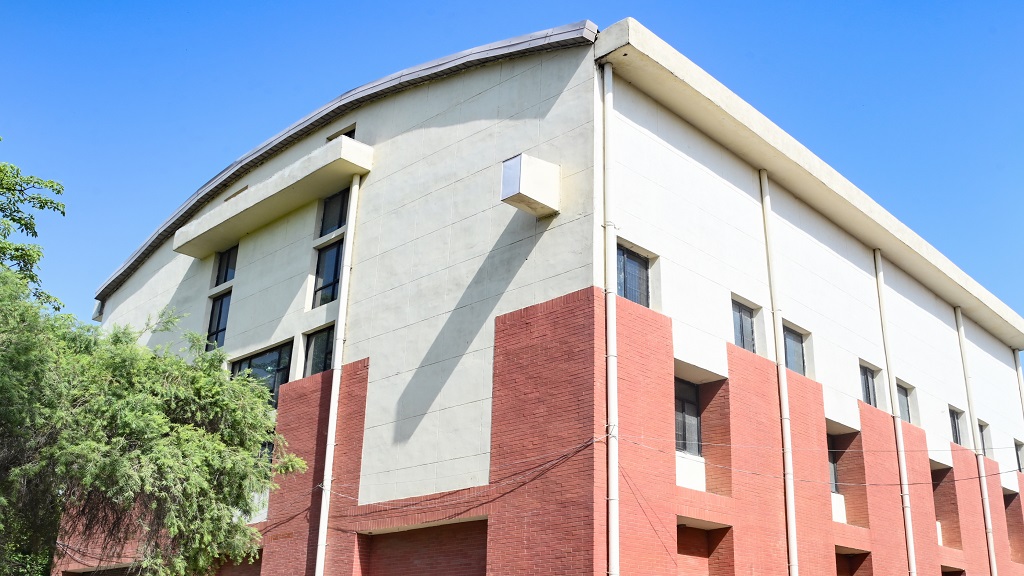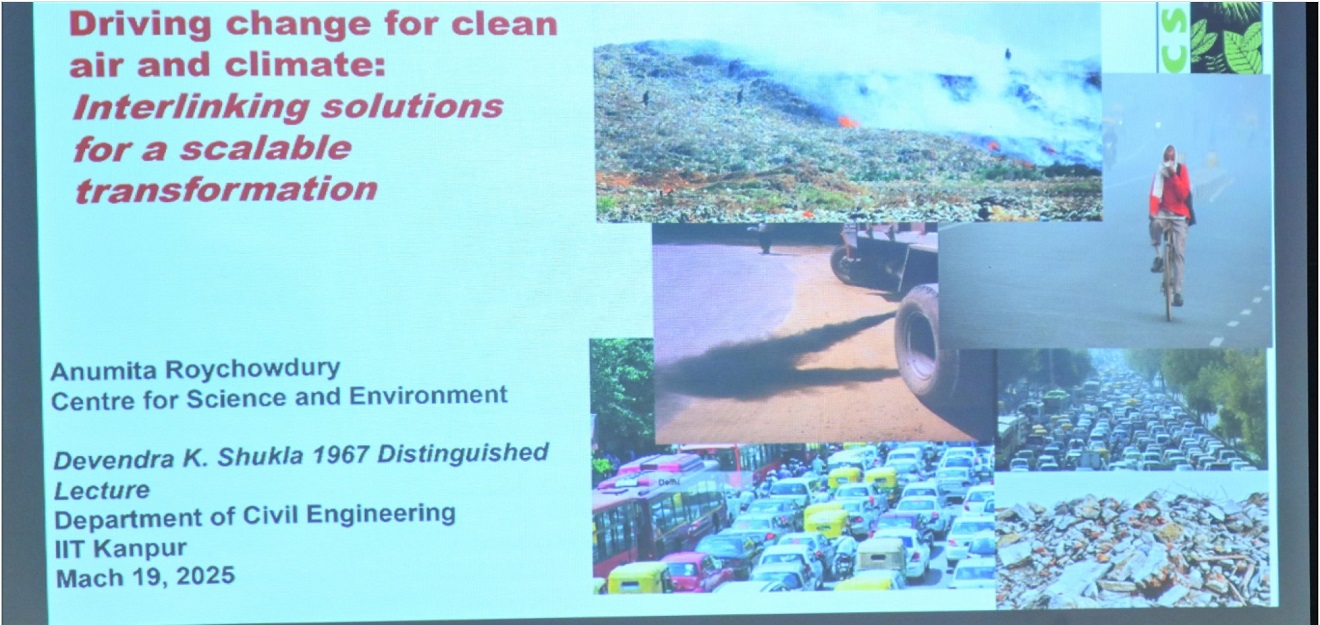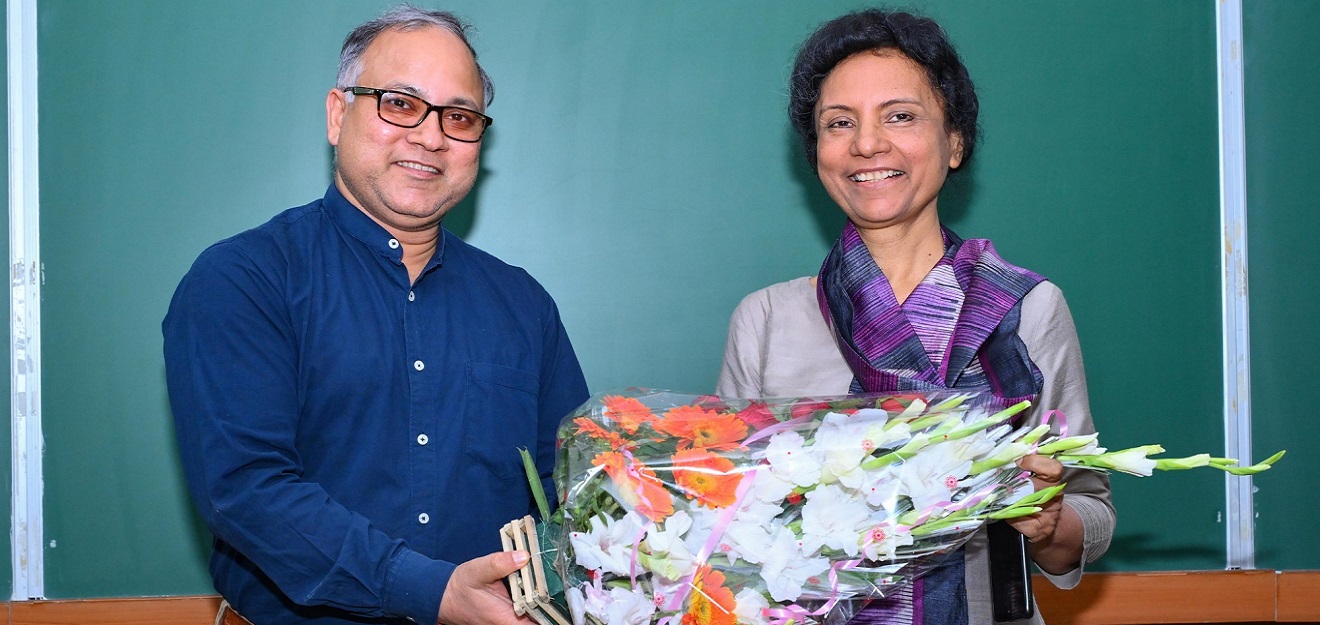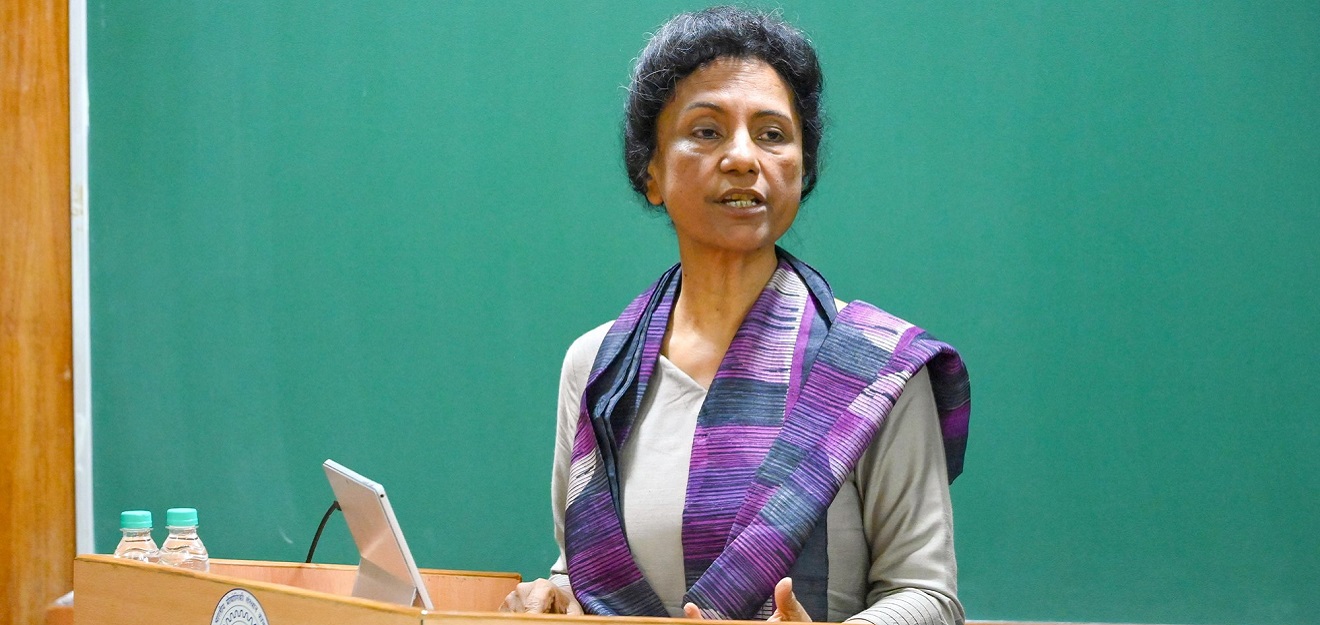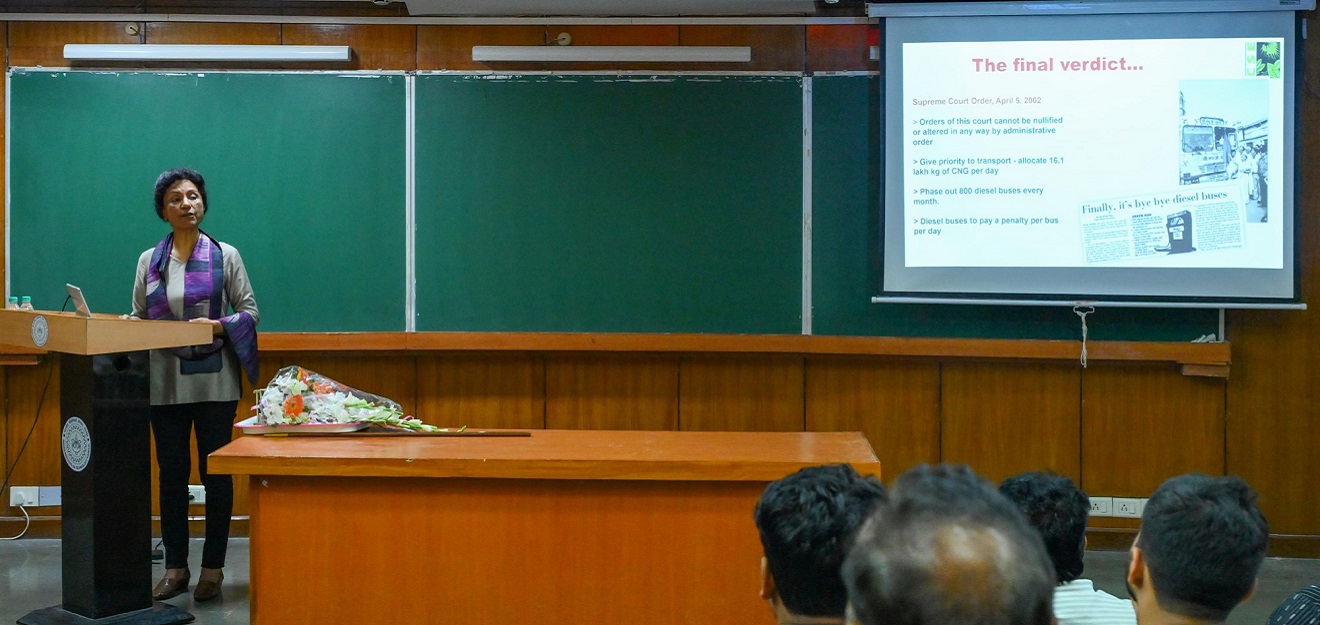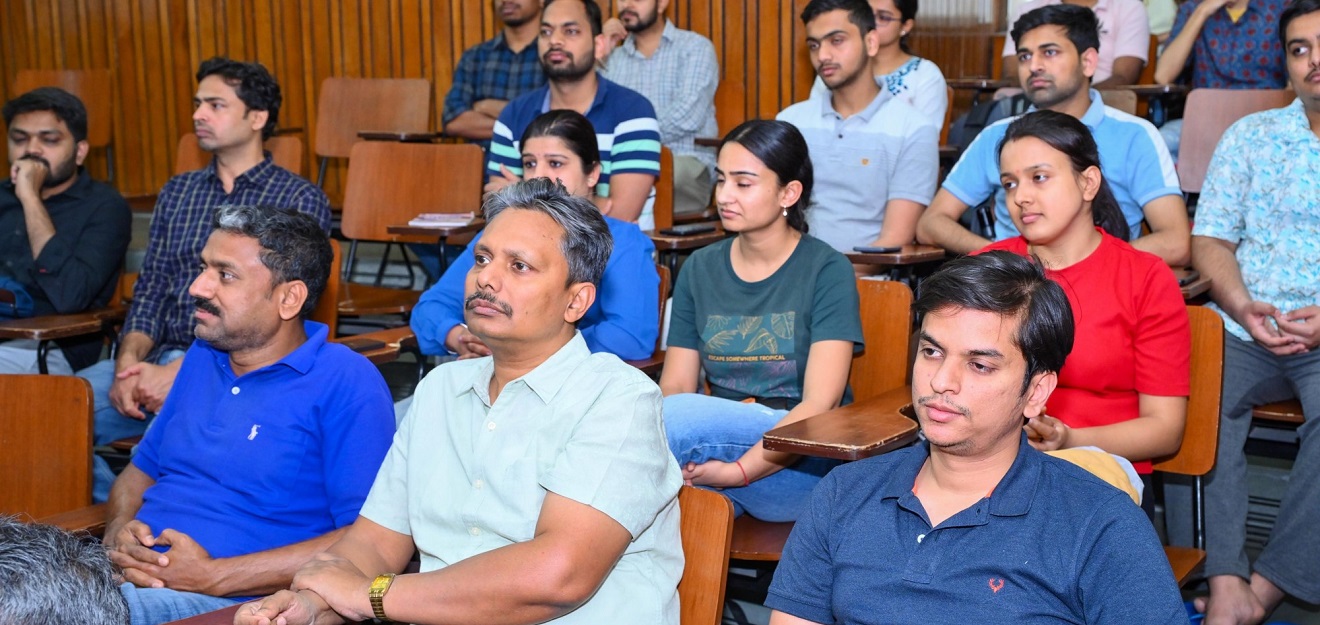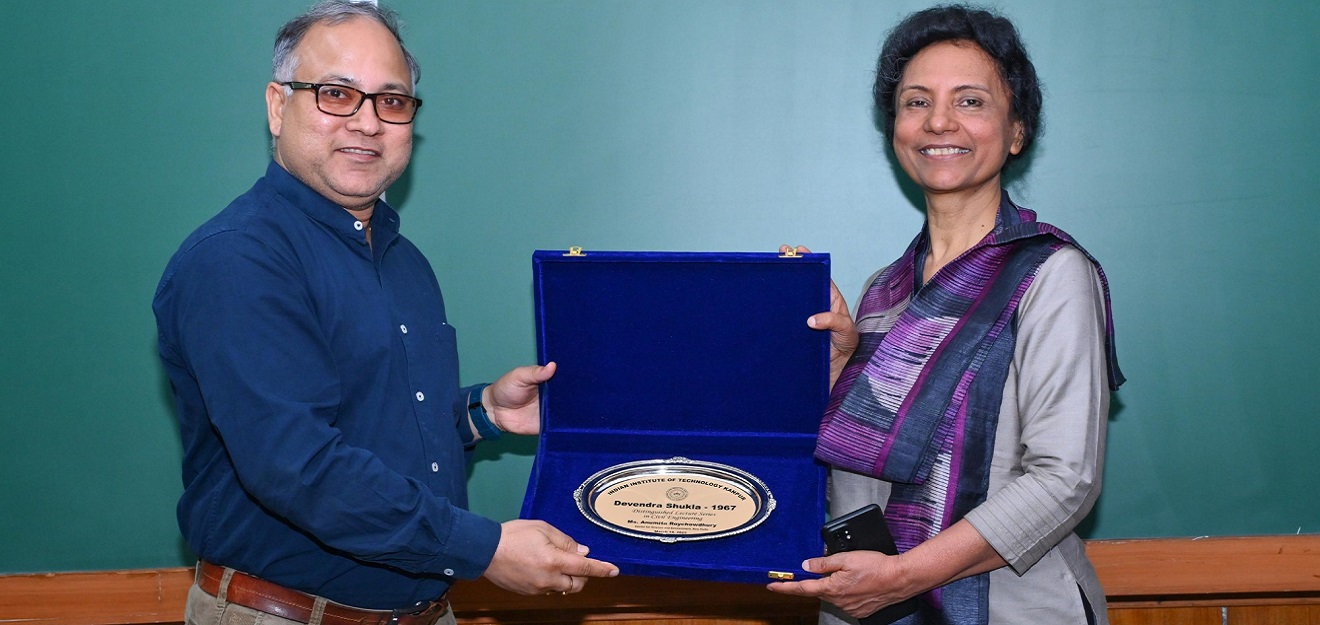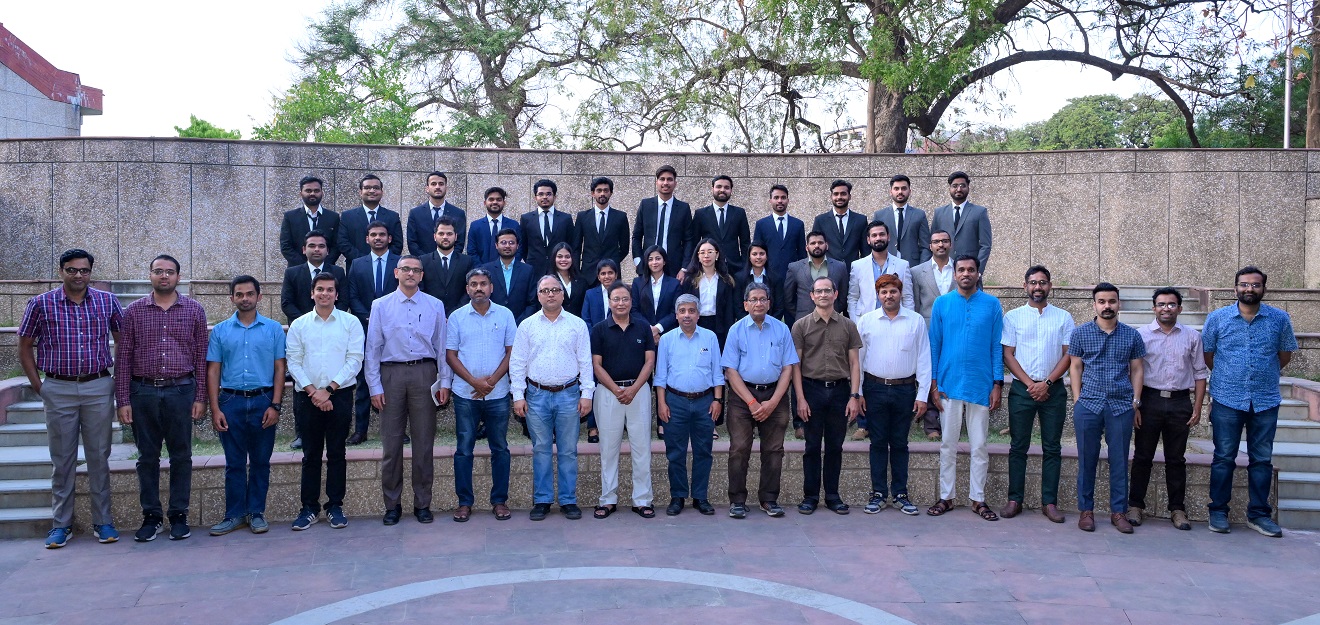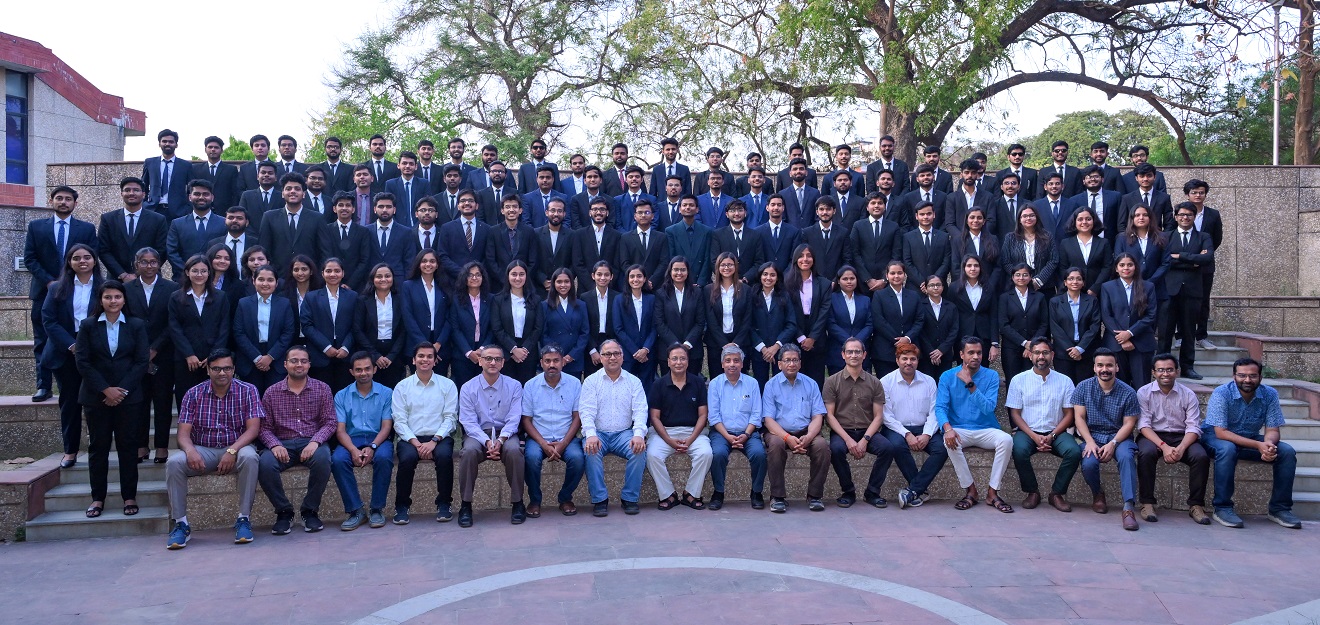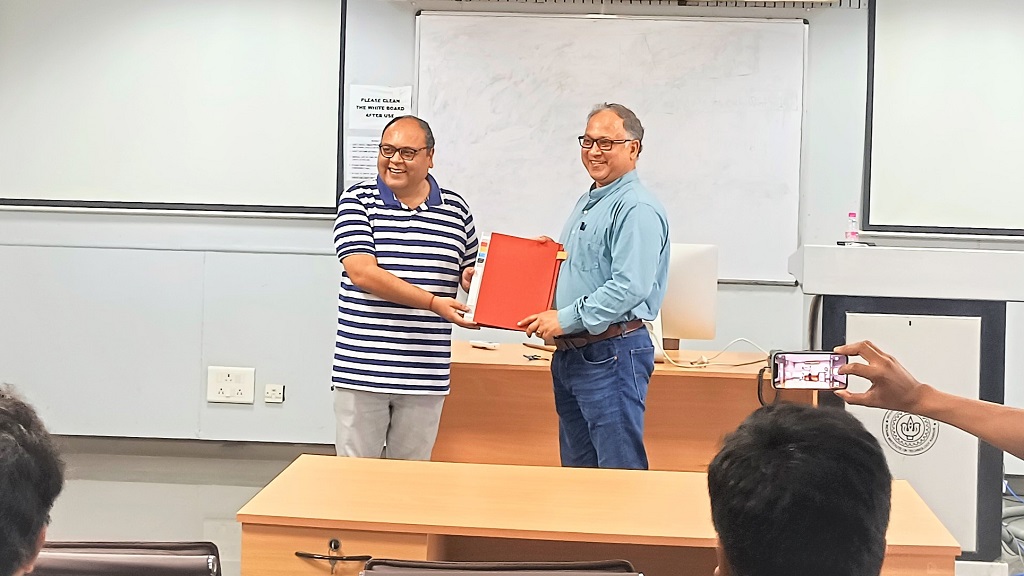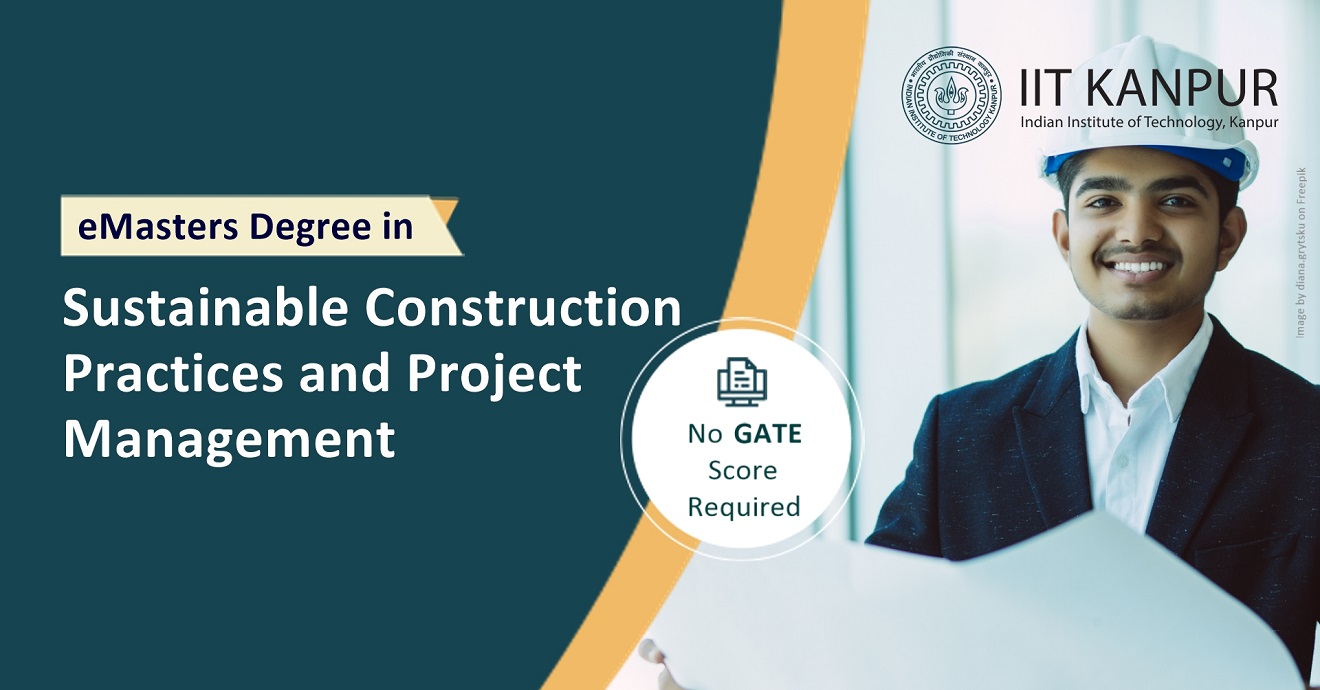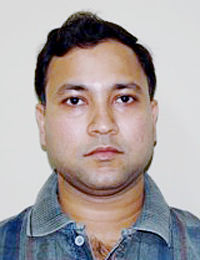Faculty
Research
Publications
Admissions
Welcome Message
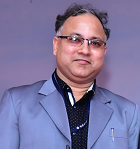
The Department of Civil Engineering at IIT Kanpur is producing since 1961, high quality technical manpower needed by industry, R&D organizations, and academic institutions.
- Read More
The Department offers B. Tech., B. Tech. - M. Tech. Dual degree in Civil Engineering, and M.Tech degree in Civil Engineering with seven specializations, i.e., Environmental Engineering, Geoinformatics, Geotechnical Engineering, Hydraulics ...
-Prof. Priyanka Ghosh
Head, Department of Civil Engineering
- 2025-26 PhD Admissions Information Webinar New
- PG admissions 2025-26-I Semester now open New
- Spot admissions to PhD program for B.Tech. studentsNew
- e-Masters Program
- Prof. S. N. Tripathi has been awarded the Alexander von Humboldt Medal 2025 of the European Geophysical Union
- Prof. Salil Goel has been selected for the INAE Young Associates 2024
- Prof. S. N. Tripathi has been selected for the Sir M. Visvesvaraya Chair
- Prof. Priyanka Ghosh has been selected for the Arjun Dev Joneja Faculty Chair
- Prof. K. V. Harish has been promoted to Associate Professor position.
- Congratulations to the Current Graduating Batch of 2024
- Prof. Gourabananda Pahar has been selected for the Sir M. Visvesvaraya Research Fellowship
- PG admissions July 2024 now open
- Devendra Shukla Distinguished Lecture Series Seminar was organized on 10th April, 2024 with Mr Krishnamurthy Subramanian, Executive Vice Chairman of Afcons Infrastructure Limited as the Distinguished Speaker
- Sankalan, a national level CE Conclave, organized by the Society of Civil Engineers IIT Kanpur, will be held from 27-28th January, 2024
- Prof. S. N. Tripathi has been awarded the prestigious Infosys Prize 2023 in ENGINEERING AND COMPUTER SCIENCE by Infosys Science Foundation.
- Prof. Priyanka Ghosh has been invited to join the Editorial Board of the International Journal of Geomechanics, ASCE, as an Associate Editor.
- IITK CE alumni (M. Tech/PhD student) Prof. Dipti Ranjan Sahoo has been awarded the prestigious Shanti Swarup Bhatnagar Prize 2022
- Applications invited for a Masters by Research (MSR) position in the area of Environmental Engineering in Walk-In mode
- Ms Akanksha, PhD student of Prof. S.N. Tripathi, has got the second position in the poster competition held in ICAS 2023, Bangalore
- Seminar on Offshore Geomechanics by Dr. Anamitra Roy, University of Melbourne, 30/08/2023
- Prof. Abhas Singh and Prof. Sudib K Mishra have been awarded Excellence-in-Teaching Award 2023
- Dr. Suparno Mukhopadhyay has been selected as the prestigious Professor R.N. Biswas Young Faculty Fellowship in Teaching Excellence.
- e-Masters Program
- Abhilasha Tripathi, PhD student of Prof. P. Bose has received Science innovation award at the International Conference on Agriculture and Rural development, held at Bhubaneswar.
- **Surya Sujathan (PhD student) and Prof. Abhas Singh published an article titled, "Investigation of Potential Drivers of Elevated Uranium Prevalence in Indian Groundwaters with a Unified Speciation Model" in the top journal Environmental Science and Technology **
- Patent Granted to Dr. Tarun Gupta and Mr. Anand Kumar (student) || Patent No.- 418343 || Title: MULTIPLE SLIT NOZZLE-BASED HIGH VOLUME PM2.5 IMPACTOR ASSEMBLY || IPA No.- 2088/DEL/2014
- New technology for retrofitting non-earthquake-resistant buildings can prevent major damage in old settlements
- STRENGTH MAGAZINE FOR THE YEAR 2022
- Dr. K.K. Bajpai, Scientific Officer, has been promoted to the post of Chief Scientific Officer at IIT Kanpur in the department of Civil Engineering.
- M.Tech student Anshul Rawat, Prof. Mukesh Sharma and Prof. Anubha Goyal granted a patent for developing technology for growing fresh veggies in high-altitude areas.
- Congratulation to all the Awardees (Batch 2022)
- Congratulations to Current Graduating Batch 2022.
- MSR student Tavishi Mishra has received the best oral presentation award at the ICESE 2022 conference organized at IIT Bombay.
- Prof. Tarun Gupta, current occupant of Prof. N.C. Nigam Memorial Chair
- B. Tech student Shivansh Tripathi has been awarded Prof. ASR Sai Memorial Medal and General Proficiency Medal at the 54th Convocation – 2021.
- M. Tech student Patel Ajay Kumar Dahyalal has been awarded Prof. ASR Sai Gold Medal at 54th Convocation – 2021.
- PhD student Gyanesh Kumar Singh has been awarded Outstanding Ph.D. Thesis Award at the 54th Convocation – 2021.
- PhD student Behera Prasanna Kumar has been awarded Outstanding Ph.D. Thesis Award at the 54th Convocation - 2021.
- Prof. Gaurav Tiwari's publication has been awarded IGS-Roorkee Chapter YGE Award 2021(Best Paper published in the area of Rock Mechanics).
- Prof. Durgesh C. Rai has been awarded the 2021 John B. Scalzi Research Award during The Masonry Society’s Annual Meeting in Nashville, Tennessee
- Prof. Sachchida N. Tripathi has been invited to join the Advisory Board of Journal, Environmental Science: Atmospheres, published by the Royal Society of Chemistry.
- Prof. Mukesh Sharma has been appointed as an honorary non-remunerative member of the WHO Global Air Pollution and Health - Technical Advisory Group (GAPH-TAG).
- PhD student Mr Akshat Verma received a certificate of merit from American Chemical Society (ACS) Fall 2020 virtual meeting.
- Prof. Sachchidanand Tripathi has received the prestigious J.C. Bose Fellowship from SERB, DST.
- New programme DIIT program in three broad areas: (i) Geodesy (ii) Navigation and Mapping and (iii) Remote Sensing and GIS.
- Prof. Sachchidanand Tripathi has been elected as the Fellow of Indian National Science Academy.
- Prof. Partha Chakroborty has been chosen as the recipient of the Excellence in Teaching Award 2020.
- Prof. Rajesh Srivastava has been chosen as the recipient of the Excellence in Teaching Award 2020.
- Prof. Sachchida Tripathi has been appointed as a member of Editorial Advisory Board of Environmental Science and Technology Letters.
- Dr. Pranamesh Chakraborty is serving as one of the guest editors in the Special Issue "Deep Learning in Transportation" in the BDAT journal.
- Mr. Vishwajeet Khan (Ph.D. Student) has been awarded IGS-Bangalore Chapter Young Geotechnical Engineer Award for the year 2019 (Best Paper published in the area of Environmental Geotechnology).
- Dr. Gaurav Tiwari has been awarded IGS-Prof. Leonard’s Annual Award for the year 2018 for his Ph.D Thesis.
- PG admission notice 2019-20, 2nd Semester
- Prof. B. Nagarajan has been chosen as the recipient of the Excellence in Teaching Award 2019.
- Prof. P. Bose has been chosen as the recipient of the Excellence in Teaching Award 2019.
- Prof. Nihar Ranjan Patra has been invited as a member of Editorial Board of Indian Geotechnical Journal (2019).
- Prof. Priyanka Ghosh has been invited as a member of Editorial Board of Indian Geotechnical Journal (2019)
- Mr. Sunil Nishad received Merit Award - 2018 for his relentless service to the users of the Hydraulics Laboratory.
- Dr. Salil Goel has been selected for the Young Geospatial Scientist 2018 award and the Rachapudi Kamakshi Memorial Gold Medal.
- PG admission notice 2018-19, 2nd Semester and 2019-20, 1st semester.
- STudent Enrichment Program (STEP) – An initiative to facilitate students’ travel
- Mr. Saifi Izhar (PhD student) has been awarded with Outstanding Poster Presentation Award at the international conference AJM 2018 Xian.
- Dr. Tarun Gupta, has been selected for the INAE Innovator Entrepreneur Award 2018.
- Presentation: Welcome to New PG students 2018-19.
- Prof. SachchidaNand Tripathi awarded 2018 UP Ratna Award, Government of Uttar Pradesh.
- Prof. Salil Goel Awarded Best Paper Award for the paper titled " An Indoor Outdoor Cooperative Localization Framework for UAVs" at International Global Navigation Satellite Systems (IGNSS) Conference 2018 held in Sydney, Australia from February 7-9, 2018.
- Prof. Priyanka Ghosh has become the member of Editorial Review Board in International Journal of Geotechnical Earthquake Engineering (2018).
- Dr. Sudib Kumar Mishra (CE), has been selected for the INAE Young Engineer Award of 2016
- Prof. Sachchida Nand Tripathi (Civil Engg.) awarded Shanti Swarup Bhatnagar Prize in Earth, Atmosphere, Ocean & Planetary Sciences.
- Visit PG admission section to see the list of selected M.Tech. and M.S.R. candidates in the last round of admissions.
- Dr. S.N. Tripathi is fundedresearch project entitled "Building a Novel System for Soot: Measurement, Toxicity Assessment and Source Identification" funded by MHRD, India.
- Dr. Bharat Lohani delivered lecture talk entitled "LiDAR Remote Sensing and Its Application Potential" in IIRS User Interaction Meet 2014, Dehradun on February 20, 2014.
- Dr. D.C. Rai delivered lecture talk entitled "Masonry Research at IIT Kanpur" at IIT Guwahati, Guwahati on March 21, 2014.
- Dr. S.N. Tripathi delivered lecture talk entitled "Observations and Monitoring Needs" and "Scientific Basis for Knowledge to Action" in Policy Conclave on Reducing Vehicular Emissions to Improve Air Quality, New Delhi on February 4, 2014.
- Dr. S.N. Tripathi delivered lecture talk entitled "Atmospheric Aerosol Measurements: India Perspective" in National Space Science Symposium, Dibrugargh on February 1, 2014
- Dr. Tarun Gupta delivered lecture talk entitled "Measurement Instrumentation for Radiatively Active Constituents"in 1st Climate Science and Policy Workshop, Mumbai on March 7, 2014.
- Ganesh, R., & Sahoo, J. P. (2023). Kinematic horizontal slice method for uplift capacity analysis of plate anchors in nonhomogeneous soils with a nonlinear failure criterion. In Computers and Geotechnics (Vol. 159, p. 105407). Elsevier BV. https://doi.org/10.1016/j.compgeo.2023.105407
- Parik, P., & Patra, N. R. (2023). Applicability of Clay Soil Stabilized with Red Mud, Bioenzyme, and Red Mud–Bioenzyme as a Subgrade Material in Pavement. In Journal of Hazardous, Toxic, and Radioactive Waste (Vol. 27, Issue 2). American Society of Civil Engineers (ASCE). https://doi.org/10.1061/jhtrbp.hzeng-1182
- Cai, X., Leng, Z., Kumar Ashish, P., Yang, J., & Gong, M. (2023). Quantitative analysis of the role of temperature in the mesoscale damage process of semi flexible pavement composite through finite element method. In Theoretical and Applied Fracture Mechanics (Vol. 124, p. 103742). Elsevier BV. https://doi.org/10.1016/j.tafmec.2022.103742
- Majumder, R., Chakraborty, S., & Mishra, S. K. (2023). Reliability analysis and design of randomly imperfect thin cylindrical shells against post-critical drops. In Thin-Walled Structures (Vol. 185, p. 110576). Elsevier BV. https://doi.org/10.1016/j.tws.2023.110576
- Mufti, S., & Das, A. (2023). Multiscale pore network construction for two phase flow simulations in granular soils. In Advances in Water Resources (Vol. 173, p. 104386). Elsevier BV. https://doi.org/10.1016/j.advwatres.2023.104386
- Huang, T., Chakraborty, P., & Sharma, A. (2023). Deep convolutional generative adversarial networks for traffic data imputation encoding time series as images. In International Journal of Transportation Science and Technology (Vol. 12, Issue 1, pp. 1–18). Elsevier BV. https://doi.org/10.1016/j.ijtst.2021.10.007
- Gupta, S., & Nair, S. (2023). A review of the emerging role of UAVs in construction site safety monitoring. In Materials Today: Proceedings. Elsevier BV. https://doi.org/10.1016/j.matpr.2023.03.135
- Singh, G. K., Qadri, A. M., Paul, D., Gupta, T., Mukherjee, S., & Chatterjee, A. (2023). Investigation of sources and atmospheric transformation of carbonaceous aerosols from Shyamnagar, eastern Indo-Gangetic Plains: Insights from δ13C and carbon fractions. In Chemosphere (Vol. 326, p. 138422). Elsevier BV. https://doi.org/10.1016/j.chemosphere.2023.138422
- Xie, S.-C., Kolay, C., Feng, D.-C., & Ricles, J. M. (2023). Nonlinear static analysis of extreme structural behavior: Overcoming convergence issues via an unconditionally stable explicit dynamic approach. In Structures (Vol. 49, pp. 58–69). Elsevier BV. https://doi.org/10.1016/j.istruc.2023.01.086
- Sahu, C. K., & Neufeld, J. A. (2023). Experimental insights into gravity-driven flows and mixing in layered porous media. In Journal of Fluid Mechanics (Vol. 956). Cambridge University Press (CUP). https://doi.org/10.1017/jfm.2022.1082
- Malik, R., Singh, G., Dikshit, O., & Yamaguchi, Y. (2023). General Five-Component Scattering Power Decomposition with Unitary Transformation (G5U) of Coherency Matrix. In Remote Sensing (Vol. 15, Issue 5, p. 1332). MDPI AG. https://doi.org/10.3390/rs15051332
- Sujathan, S., & Singh, A. (2023). Investigation of Potential Drivers of Elevated Uranium Prevalence in Indian Groundwaters with a Unified Speciation Model. In Environmental Science & Technology (Vol. 57, Issue 5, pp. 1970–1986). American Chemical Society (ACS). https://doi.org/10.1021/acs.est.2c08524
- Barbhaya, D., Tran, J., Khetan, A., Hejjaji, V., Jain, S., Chan, C., & Goel, A. (2023). Rationale and Design of a Study to Test the Effect of Personal Protective Aids on Hypertension and Diabetes in People Living With High Levels of Air Pollution—Study Protocol. In Heart, Lung and Circulation (Vol. 32, Issue 1, pp. 124–130). Elsevier BV. https://doi.org/10.1016/j.hlc.2022.11.001
- Kumar, S., Tiwari, G., & Das, A. (2023). Experimental assessment of dynamic loading response of grouted non-persistent jointed rock. In IOP Conference Series: Earth and Environmental Science (Vol. 1124, Issue 1, p. 012055). IOP Publishing. https://doi.org/10.1088/1755-1315/1124/1/012055
- Bagchi, A., & Raychowdhury, P. (2023). Sensitivity Study of the Pressure-Dependent Soil Model Based on the Abutment-Backfill Pushover Behaviour. In Lecture Notes in Civil Engineering (pp. 129–139). Springer Nature Singapore. https://doi.org/10.1007/978-981-19-6998-0_13
- Das, G., & Ghosh, P. (2023). Effect of Footing Size on the Dynamic Behaviour of Cohesionless Soil-Foundation System. In Lecture Notes in Civil Engineering (pp. 505–513). Springer Nature Singapore. https://doi.org/10.1007/978-981-19-6998-0_43
- Pandey, B. K., Rajesh, S., & Chandra, S. (2022). A State-of-the-Art Review on Electro-osmotic Treatment for Stabilization of Soft Soils. In Lecture Notes in Civil Engineering (pp. 225–234). Springer Nature Singapore. https://doi.org/10.1007/978-981-19-6727-6_20
- Latha, L., Ray-Chaudhuri, S., Mukhopadhyay, S., & Bajpai, K. K. (2022). Seismic Performance Enhancement of Unreinforced Brick Masonry Buildings by Retrofitting with Reinforced Concrete Bands: Full Scale Experiments. In Journal of Structural Engineering (Vol. 148, Issue 12). American Society of Civil Engineers (ASCE). https://doi.org/10.1061/(asce)st.1943-541x.0003460
- Latha, L., Ray-Chaudhuri, S., Mukhopadhyay, S., & Bajpai, K. K. (2022). Seismic Performance Enhancement of Unreinforced Brick Masonry Buildings by Retrofitting with Reinforced Concrete Bands: Full Scale Experiments. In Journal of Structural Engineering (Vol. 148, Issue 12). American Society of Civil Engineers (ASCE). https://doi.org/10.1061/(asce)st.1943-541x.0003460
- Gurjar, S. K., Shrivastava, S., Suryavanshi, S., & Tare, V. (2022). Assessment of the natural flow regime and its variability in a tributary of Ganga River: Impact of land use and land cover change. In Environmental Development (Vol. 44, p. 100756). Elsevier BV. https://doi.org/10.1016/j.envdev.2022.100756
- Chaudhary, A., & Akhtar, A. (2022). Template for Evaluating Cradle-to-Site Environmental Life Cycle Impacts of Buildings in India. In ACS Environmental Au (Vol. 3, Issue 2, pp. 94–104). American Chemical Society (ACS). https://doi.org/10.1021/acsenvironau.2c00035
- Chhabra, J. P. S., & Rai, D. C. (2022). Experimental testing of aluminum‐core buckling restrained knee braced Truss moment frames for earthquake resistance. In Earthquake Engineering & Structural Dynamics (Vol. 52, Issue 3, pp. 660–680). Wiley. https://doi.org/10.1002/eqe.3780
- Prakasam, C., Aravinth, R., Kanwar, V. S., & Nagarajan, B. (2022). Soil erosion risk assessment and its impact on landslides – A study on parts of Himalayan Region, India. In INTERNATIONAL CONFERENCE ON ADVANCES IN MULTI-DISCIPLINARY SCIENCES AND ENGINEERING RESEARCH: ICAMSER-2021. INTERNATIONAL CONFERENCE ON ADVANCES IN MULTI-DISCIPLINARY SCIENCES AND ENGINEERING RESEARCH: ICAMSER-2021. AIP Publishing. https://doi.org/10.1063/5.0095256
- Balakrishna Madayala, A., Jain, A., & Lohani, B. (2022). Development of a Physics-Guided Neural Network Model for Effective Urban Flood Management. In Journal of Hydrologic Engineering (Vol. 27, Issue 9). American Society of Civil Engineers (ASCE). https://doi.org/10.1061/(asce)he.1943-5584.0002196
- Mahata, B. K., Chang, S., & Bose, P. (2022). Bio-Inspired phosphate adsorption by Copper-Decorated weak base anion exchanger. In Separation and Purification Technology (Vol. 296, p. 121339). Elsevier BV. https://doi.org/10.1016/j.seppur.2022.121339
- Khan, S., Ashish, P. K., Kannelli, V., Hossain, K., Nagabhushana, M. N., & Tiwari, D. (2022). Potential application of over-burnt brick and fly ash for sustainable inverted pavement structure. In Construction and Building Materials (Vol. 345, p. 128298). Elsevier BV. https://doi.org/10.1016/j.conbuildmat.2022.128298
- Vishwakarma, B. D., Ramsankaran, R., Azam, Mohd. F., Bolch, T., Mandal, A., Srivastava, S., Kumar, P., Sahu, R., Navinkumar, P. J., Tanniru, S. R., Javed, A., Soheb, M., Dimri, A. P., Yadav, M., Devaraju, B., Chinnasamy, P., Reddy, M. J., Murugesan, G. P., Arora, M., … Bamber, J. (2022). Challenges in Understanding the Variability of the Cryosphere in the Himalaya and Its Impact on Regional Water Resources. In Frontiers in Water (Vol. 4). Frontiers Media SA. https://doi.org/10.3389/frwa.2022.909246
- Gupta, B. K. (2022). Dynamic pile-head stiffness of laterally loaded end-bearing pile in linear viscoelastic soil − A comparative study. In Computers and Geotechnics (Vol. 145, p. 104654). Elsevier BV. https://doi.org/10.1016/j.compgeo.2022.104654
- Chauhan, P., Kanagaraj, V., & Asaithambi, G. (2022). Understanding the mechanism of lane changing process and dynamics using microscopic traffic data. In Physica A: Statistical Mechanics and its Applications (Vol. 593, p. 126981). Elsevier BV. https://doi.org/10.1016/j.physa.2022.126981
- Bhat, N. U. H., & Pahar, G. (2022). Depth-averaged coupling of submerged granular deformation with fluid flow: An augmented HLL scheme. In Journal of Hydrology (Vol. 606, p. 127364). Elsevier BV. https://doi.org/10.1016/j.jhydrol.2021.127364
- Soni, P., Tripathi, S., & Srivastava, R. (2022). Impact of renewed solar dimming on streamflow generation in monsoon dominated tropical river basins. In Journal of Hydro-environment Research (Vol. 41, pp. 12–24). Elsevier BV. https://doi.org/10.1016/j.jher.2022.02.002
- Soni, P., Tripathi, S., & Srivastava, R. (2022). Impact of renewed solar dimming on streamflow generation in monsoon dominated tropical river basins. In Journal of Hydro-environment Research (Vol. 41, pp. 12–24). Elsevier BV. https://doi.org/10.1016/j.jher.2022.02.002
- Vikram, D., Mittal, S., & Chakroborty, P. (2022). Stabilized finite element computations with a two-dimensional continuum model for disorderly traffic flow. In Computers & Fluids (Vol. 232, p. 105205). Elsevier BV. https://doi.org/10.1016/j.compfluid.2021.105205
Admission to the B. Tech program in Civil Engineering is through the Joint Entrance (Advanced) Examination.
The duration of the B. Tech program is normally 4-years (8-semesters). However, students can finish the program in 3.5 years (7-semesters) if they complete all requirements within that time. The minimum requirements involve successful completion of the following course credits.
| Institute Core (IC) | 112 | Credits |
| Department Compulsory (DC) | 91 | Credits |
| Department Elective (DE) | 68 | Credits |
| Open Elective (OE) | 51 | Credits |
| E/SO | 45 | Credits |
| SCHEME | 54-58 | Credits |
| Total | 421-425 | Credits |
A student will only graduate once he/she completes the required credits as above, irrespective of the number of semesters taken for this.
The detailed course requirement and suggested template for B. Tech in Civil Engineering are available here.
Branch Change
A student joining Civil Engineering department for a B. Tech degree can opt for Branch Change and join some other department either at the end of the 2nd, 3rd or 4th semester in the B. Tech program. Branch Change is granted strictly as per rules governing Branch Change as given in the UG manual
Additionally, students are also allowed Branch Change on compassionate reasons at any time up to the 4th semester. The criteria for such requests are given in the UG manual. Such requests are granted by the academic senate on a case-by-case basis.
Branch Change, one granted, CANNOT be reversed.
B.Tech / BS students from other departments may also join the Civil Engineering Department through Branch Change after their 2nd, 3rd or 4th semesters. Such students have to fulfill all the graduation requirements of the Civil Engineering Department. Civil Engineering Department shall not be responsible if the academic program of such students extend beyond the normal 4-year (8-semester) duration of the B. Tech program due to complications arising from Branch Change. Any departmental courses done by these students in their original department can however be counted against the OE requirements of the B. Tech (Civil Engineering) program.
Dual Degree Program
A Civil Engineering B. Tech student may choose to opt for a Dual Degree Program. A student completing a dual degree program earns both the B.Tech (Civil Engineering) and an M.Tech/MS/MBA degree on graduation. The normal duration of all dual degree programs is 5-years.
Students should have a minimum CPI of 6.0 at the time of applying for a dual degree program. Additionally, students should have no more than 36-credit backlog in credits of their B. Tech program at the time of applying for the dual degree program. [Example: Consider a student applying for dual degree program after the 6th semesters in the B. Tech program. Let us assume that the student is supposed to complete X credits after 6 semesters as per the suggested UG template of the CE department. In order to apply for the dual degree program, the student must have completed at least (X – 36) credits.]
The dual degree program for a B.Tech (Civil Engineering) student may be of three types,
| CATEGORY A: | B. Tech (Civil Engineering) + M. Tech (Civil Engineering) |
Students may apply for Category-A dual degree program after their 5th, 6th, or 7th semesters. However the Civil Engineering Department prefers that students apply for the CATEGORY-A dual degree program during their 6th semester, i.e., they start their dual degree program from the 7th semester onwards.
Students in their 6th semester and wanting to opt for the dual degree program must apply in response to the call for admission to the CATEGORY-A dual degree program made during that semester. There are no limits on the number of seats for Category-A dual degree program of the Civil Engineering Department. If accepted in the CATEGORY-A dual degree program of Civil Engineering Department, the student must get the consent of any Civil Engineering faculty member to be his/her thesis supervisor and register for courses and thesis credits in the 7th – 10th semester with the consent of the thesis supervisor. The students are also advised to follow the suggested template for Category-A Dual Degree Program.
A CATEGORY-A dual degree student is entitled to a waiver of 45-OE credits and 9-DE credits from the B.Tech (Civil Engineering) graduation requirements. Further, such students can take CE491A or CE492A for OE credits.
A CATEGORY-A dual degree student can request for withdrawal from the M. Tech part of the dual degree program at any time during the course of the dual degree program. Further, the M. Tech part of the program will be withdrawn if a student is more than 40 credits short of the total credit requirement of her/his B. Tech program at the end of the eighth semester. Students should consult UG manual for minimum PG-CPI requirements of the dual degree program.
In case the M. Tech part of the program of a CATEGORY-A dual degree student is withdrawn for any reason, the student will be required to complete all mandatory graduation requirements of the undergraduate program for graduation with a B. Tech degree. However, PG courses taken towards M. Tech degree may be counted as OE credits for the UG graduation requirements.
| CATEGORY B: | B.Tech (Civil Engineering) + M.Tech (in another engineering department) |
| B.Tech (Civil Engineering) + MS (in a science department) | |
| B.Tech (Civil Engineering ) + M.Des (in design program) | |
| CATEGORY C: | B.Tech (Civil Engineering ) + MBA (in IME Department) |
CE B. Tech students may opt for Category-B/C dual degree program after their 6th semester. Students in their 6th semester and wanting to opt for the dual degree program must apply in response to the call for admission to the CATEGORY-B/C dual degree program made during that semester.
In additional to the standard eligibility requirements for dual degree programs, many departments have additional requirements such as interviews or written tests for CATEGORY-B/C dual degree applicants. Students may approach the concerned department / program for details regarding such additional eligibility norms. Most departments also have seat restrictions for CATEGORY-B/C dual degree applicants as specified in the UG manual.
The M.Tech/MS part of the academic program of a CATEGOTY-B/C dual degree student will be administered by the DUGC of the concerned department. The student should approach the DUGC convener of the concerned department regarding the template, course requirements, time table clashes and other issues.
A CATEGORY-B/C dual degree student is entitled to a waiver of 36-OE credits from the B.Tech (Civil Engineering) graduation requirements. Further, such students can take CE491A or CE492A for OE credits.
A CATEGORY-B/C dual degree student can request for withdrawal from the M. Tech part of the dual degree program at any time during the course of the dual degree program. Further, the M. Tech part of the program will be withdrawn if a student is more than 40 credits short of the total credit requirement of her/his B. Tech program at the end of the eighth semester. Students should consult UG manual for minimum PG-CPI requirements of the dual degree program.
In case the M. Tech part of the program of a CATEGORY-B/C dual degree student is withdrawn for any reason, the student will be required to complete all mandatory graduation requirements of the undergraduate program for graduation with a B. Tech (Civil Engineering) degree. However, PG courses taken towards M. Tech degree may be counted as OE credits for the UG graduation requirements.
Double Major Program
A Civil Engineering B. Tech student may choose to opt for a Double Major Program. A student completing a Double Major Program earns both the B.Tech (Civil Engineering) and a B.Tech/BS degree from another department on graduation. The normal duration of all Double Major Programs is 5-years.
Students should have a minimum CPI of 8.0 at the time of applying for a Double Major Program. Admission to the Double Major program is subject to overall CPI ranking and availability of seats. Details regarding seat availability are given in the UG manual.
Students may opt for Double Major program after their 4th semester. Students in their 4th semester and wanting to opt for the Double Major Program must apply in response to the call for admission to the Double Major Program made during that semester. Once a student is admitted into the Double Major program, s/he will be advised by the DUGC conveners of both the parent and the Second Major departments regarding the course template, course requirements, time table clashes and other issues.
A Double Major student is entitled to a waiver of 36-OE credits from the B.Tech (Civil Engineering) graduation requirements.
A student may withdraw at any time from the Double Major program. Additionally, the Second Major will be withdrawn at the end of the eighth semester if the student is short of 30 credits or more from completing the First Major, or if her/his CPI falls below 6.0.
In case the Second Major of a Double Major student is withdrawn for any reason, the student will be required to complete all mandatory graduation requirements of the undergraduate program for graduation with a B. Tech (Civil Engineering) degree. However, courses taken towards the Second Major may be counted as OE credits for the B. Tech (Civil Engineering) graduation requirements.
Minor
A Minor entails the completion of 27-36 credits through specified courses within a discipline/program. The final Grade Card of the student on graduation will mention any Minors taken by the student. Thus a B.Tech (Civil Engineering) student can use some of the OE credits (minimum 54 credits) available to her/him to do one (or two) minors.
A list of approved Minors is available with DOAA office. A Civil Engineering student cannot apply for a Minor in Civil Engineering Department.
The DOAA office will call for applications for Minors in every semester at least two weeks before the dates for pre-registration. Any B. Tech or Dual Degree student (but not Double Major) can apply for a Minor during their 4th, 5th or 6th Semester.
A student may apply for a Minor after completing some of the courses in the Minor. A student may also complete all the required courses of a Minor as OE before applying for a Minor. The DOAA office will call for applications for such retrospective Minors once a year in April. A student may withdraw from a Minor anytime by submitting an application to this effect with the approval of the Minor department's DUGC convener, to the DOAA office.
Applications are invited from persons having PhD in Civil Engineering or in a closely related field, for appointment at Department of Civil Engineering under the Institute Post-Doctoral Fellowship scheme of IIT Kanpur. Those who have submitted their PhD theses may apply but the appointment offer will be made only after the completion of the PhD degree. Applications are accepted round the year and are given prompt consideration.
Emolument and other details: https://www.iitk.ac.in/dofa/data/Institute_Postdoctoral_Norms_15_May_2024.pdf
We invite applications for faculty positions at all levels (Assistant, Associate and Full Professor) in all areas of Environmental Engineering, Geoinformatics, Geotechnical Engineering, Hydraulics and Water Resources Engineering, Infrastructure and Engineering Management, Structural Engineering, and Transportation Engineering.
Persons of Indian Origin (PIO) and Overseas Citizens of India (OCI) can apply for these positions.
Foreign Nationals are also eligible and are encouraged to apply. For details, please visit (click)
Priority Areas:
The department is currently seeking applications in the priority areas listed at click
Requirements:
PhD in Civil Engineering or a closely related field with excellent academic record, proven research potential and strong commitment to teaching and research.
Undergraduate degree in Civil Engineering is not mandatory.
Post-PhD experience is not a requirement, and those who have just graduated or are about to graduate are encouraged to apply.
Responsibilities:
Teaching undergraduate and graduate courses, supervising graduate theses, and other related academic and administrative duties. The average teaching load for a faculty member is 4-5 contact hours per week.
How to apply:
Applications are accepted round the year and are given prompt consideration. Application has to be submitted online at https://pingala.iitk.ac.in/IITKFR-0/login . You can see the current rolling advertisement at https://www.iitk.ac.in/dofa/rolling-advertisement#.
Selection Process:
All applications submitted online are available with the concerned Head of the Department as well as the Office of Faculty Affairs. The following steps are adopted for the evaluation of the applicants.
Step 1: Head of the Department forwards the application to a group of faculty members of the concerned area of specialization.
Step 2: The faculty group gives its recommendation on the suitability of the candidates for a faculty position.
Step 3: The candidates recommended by the faculty group are called for a seminar and interaction with faculty and students.
Step 4: Recommendation letters are sought from the referees of those candidates who are identified after the seminar.
Step 5: The Department Faculty Advisory Committee (DFAC) shortlists the candidates on the basis of the application, faculty input, seminar and referee comments.
Step 6: The shortlisted candidates are presented to the Institute Faculty Advisory Committee (IFAC) and are called for an interview.
If you have queries at any stage of the selection process, you can contact the Head of the Department (This email address is being protected from spambots. You need JavaScript enabled to view it. )
Benefits:
IIT Kanpur provides a stimulating environment for academic and personal growth. All new faculty members get a generous start-up research grant, a relocation allowance, and a top-up salary of 25,000 per month (for the first three years). Its beautiful campus is rich in flora and fauna. The on-campus facilities include round the clock power and water supply, primary healthcare, children's day-care, schools up to 12th standard, state-of-the art sports facilities, banks, a post office, wireless internet throughout the campus, cafes, restaurants, and a shopping complex.
To see other benefits of joining IIT Kanpur, please click here
To get a glimpse of the life of a faculty member, please see the faculty handbook
For any queries about the application process or about the Department/Institute, you are welcome to contact the Head of Department ( This email address is being protected from spambots. You need JavaScript enabled to view it. ).
If you want to visit the department, we would be glad to have you deliver a seminar and interact with our students and faculty members.
Here are brief details of IIT Kanpur's CIVIL Engineering department staff who help in the efficient administration of the department.
 Prashant Jaiswal, Superintendent
Prashant Jaiswal, Superintendent
This email address is being protected from spambots. You need JavaScript enabled to view it.
(91-512) 259 7395
313 Faculty Building
 Amita, Senior Assistant
Amita, Senior Assistant
This email address is being protected from spambots. You need JavaScript enabled to view it.
(91-512) 259 7090
313 Faculty Building
 Prateek Yadav, Junior Assistant
Prateek Yadav, Junior Assistant
This email address is being protected from spambots. You need JavaScript enabled to view it.
(91-512) 259 7631
313 Faculty Building
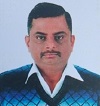 Prabha Kant Shukla, Junior Assistant
Prabha Kant Shukla, Junior Assistant
This email address is being protected from spambots. You need JavaScript enabled to view it.
(91-512) 259 7631
313 Faculty Building
Varun Lab Staff
 Sharmandra Srivastava, Sr. Tech. Superintendent
Sharmandra Srivastava, Sr. Tech. Superintendent
This email address is being protected from spambots. You need JavaScript enabled to view it.
(91-512) 259 7837
201C Western Laboratory Extension
 Atul Kumar Singh, Junior Technician
Atul Kumar Singh, Junior Technician
This email address is being protected from spambots. You need JavaScript enabled to view it.
(91-512) 259 7837
201C Western Laboratory Extension
Geotechnical Engineering Staff
 Amit Prasad, Technical Superintendent
Amit Prasad, Technical Superintendent
This email address is being protected from spambots. You need JavaScript enabled to view it.
(91-512) 259 7724
102 Western Laboratory Extension
 Sanjay Kumar, Jr. Technical Superintendent
Sanjay Kumar, Jr. Technical Superintendent
This email address is being protected from spambots. You need JavaScript enabled to view it.
(91-512) 259 7711
Workshop-2
 Rahul Prasad, Jr. Technical Superintendent
Rahul Prasad, Jr. Technical Superintendent
(91-512) 259 7724
102 Western Laboratory Extension
 Sandeep Bora, Sr. Technician
Sandeep Bora, Sr. Technician
This email address is being protected from spambots. You need JavaScript enabled to view it.
(91-512) 259 7724
102 Western Laboratory Extension
 Brajesh Kumar, Jr. Technician
Brajesh Kumar, Jr. Technician
This email address is being protected from spambots. You need JavaScript enabled to view it.
(91-512) 259 7724
102 Western Laboratory Extension
 Ashutosh Rai, Jr. Technician
Ashutosh Rai, Jr. Technician
This email address is being protected from spambots. You need JavaScript enabled to view it.
(91-512) 259 7724
102 Western Laboratory Extension
Structural Engineering Staff
 Pankaj K. Gupta, Technical Superintendent
Pankaj K. Gupta, Technical Superintendent
This email address is being protected from spambots. You need JavaScript enabled to view it.
(91-512) 259 7711
Workshop-2
 Vinay K. Dwivedi, Sr. Technical Superintendent
Vinay K. Dwivedi, Sr. Technical Superintendent
This email address is being protected from spambots. You need JavaScript enabled to view it.
(91-512) 259 7711
Workshop-2
 Mohit Dwivedi, Jr. Technical Superintendent
Mohit Dwivedi, Jr. Technical Superintendent
This email address is being protected from spambots. You need JavaScript enabled to view it.
(91-512) 259 6787
Workshop-2
 Radhey Shyam, Sr. Technician
Radhey Shyam, Sr. Technician
This email address is being protected from spambots. You need JavaScript enabled to view it.
(91-512) 259 7711
Workshop-2
 Dhruv Kumar, Sr. Technician
Dhruv Kumar, Sr. Technician
This email address is being protected from spambots. You need JavaScript enabled to view it.
(91-512) 259 7711
Workshop-2
 Amit Singh Chauhan, Junior Technician
Amit Singh Chauhan, Junior Technician
This email address is being protected from spambots. You need JavaScript enabled to view it.
0512-259-7741
Workshop-2
Hydraulics and Water Resources Staff
 P. Jagannadham, Technical Superintendent
P. Jagannadham, Technical Superintendent
This email address is being protected from spambots. You need JavaScript enabled to view it.
(91-512) 259 7765
Workshop-2
 Arun Kumar Sharma, Sr. Technician
Arun Kumar Sharma, Sr. Technician
This email address is being protected from spambots. You need JavaScript enabled to view it.
(91-512) 259 7765
Workshop-2
 Sunil Nishad, Jr. Technician
Sunil Nishad, Jr. Technician
This email address is being protected from spambots. You need JavaScript enabled to view it.
(91-512) 259 7765
Workshop-2
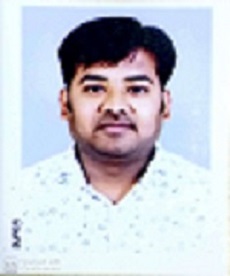 Deepak Kushwah, Jr. Technician
Deepak Kushwah, Jr. Technician
This email address is being protected from spambots. You need JavaScript enabled to view it.
(91-512) 259 7765
Workshop-2
Transportation Engineering Staff
 Manoj Kumar, Jr. Tech. Superintendent
Manoj Kumar, Jr. Tech. Superintendent
This email address is being protected from spambots. You need JavaScript enabled to view it.
(91-512) 259 7478
Workshop-2
 Saurabh Srivastava, Sr. Technician
Saurabh Srivastava, Sr. Technician
This email address is being protected from spambots. You need JavaScript enabled to view it.
(91-512) 259 7478
Workshop-2
Environmental Engineering Staff
 Arvind Kumar, Technical Superintendent
Arvind Kumar, Technical Superintendent
This email address is being protected from spambots. You need JavaScript enabled to view it.
(91-512) 259 7791
116 Western Laboratory
 Rahul, Junior Technician
Rahul, Junior Technician
This email address is being protected from spambots. You need JavaScript enabled to view it.
(91-512) 259 7791
116 Western Laboratory
Geoinformatics Staff
 Ram Kewal Maurya, Technical Superintendent
Ram Kewal Maurya, Technical Superintendent
This email address is being protected from spambots. You need JavaScript enabled to view it.
(91-512) 259 7722
115 Western Laboratory Extension
 Hari Babu Prajapati, Technical Superintendent
Hari Babu Prajapati, Technical Superintendent
This email address is being protected from spambots. You need JavaScript enabled to view it.
0512-259-7722/2208
Room no.101, PEB, B Block, near Airstrip
 Shitla Prasad Tripathi, Sr. Technician
Shitla Prasad Tripathi, Sr. Technician
This email address is being protected from spambots. You need JavaScript enabled to view it.
(91-512) 259 7722
115 Western Laboratory Extension
 Vipul Sharma, Sr. Technician
Vipul Sharma, Sr. Technician
This email address is being protected from spambots. You need JavaScript enabled to view it.
0512-259-7722/2209
Room no.101, PEB, B Block, near Airstrip
Infrastructure Engineering and Management Staff
 Vipul Kumar Pradhan, Jr. Technician
Vipul Kumar Pradhan, Jr. Technician
This email address is being protected from spambots. You need JavaScript enabled to view it.
(91-512) 259 2519
707 Engineering Sciences Building -01
 Ashok Singh Chauhan, Project Manager
Ashok Singh Chauhan, Project Manager
This email address is being protected from spambots. You need JavaScript enabled to view it.
(91-512) 259 2519
707 Engineering Sciences Building -01

